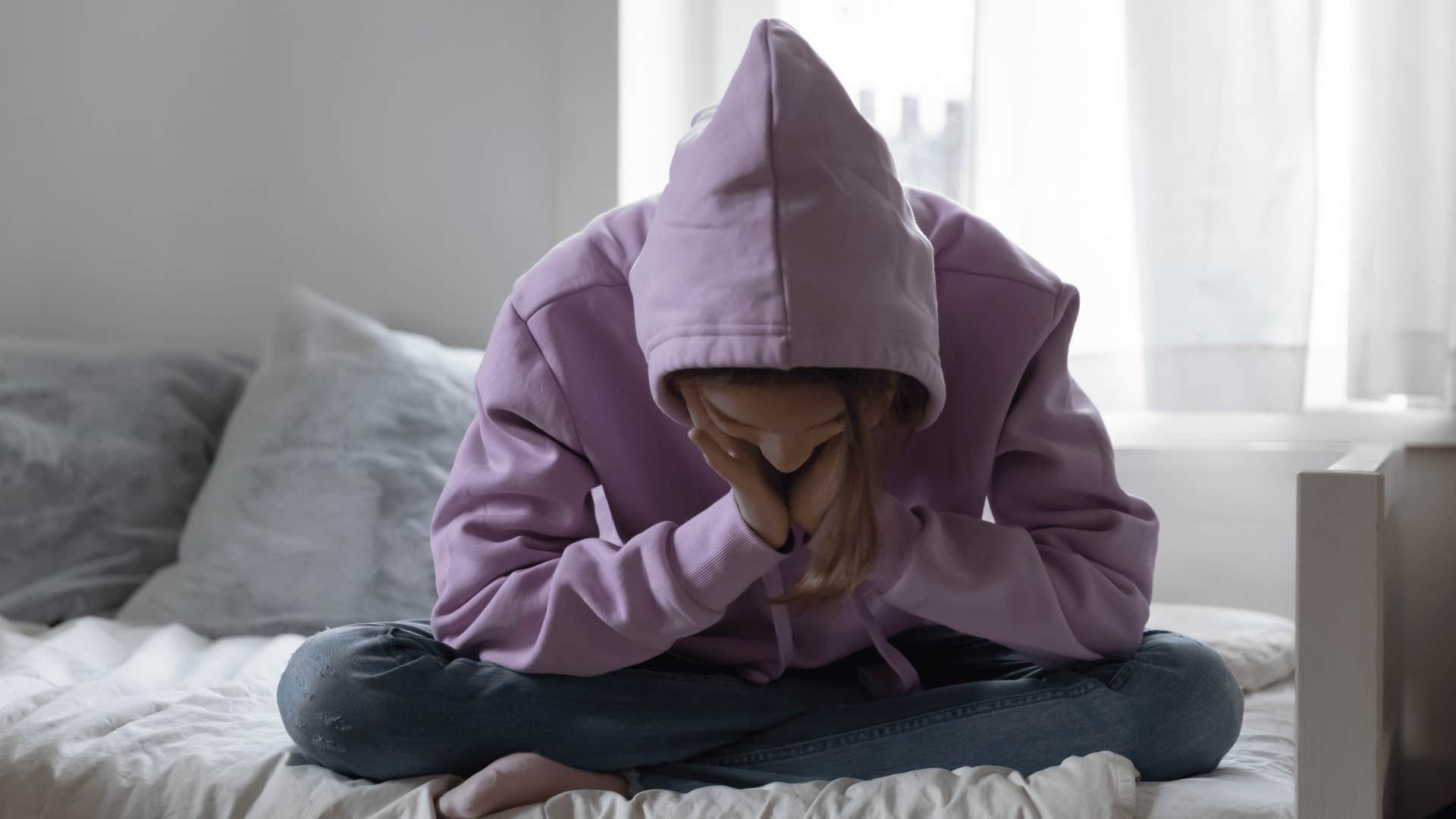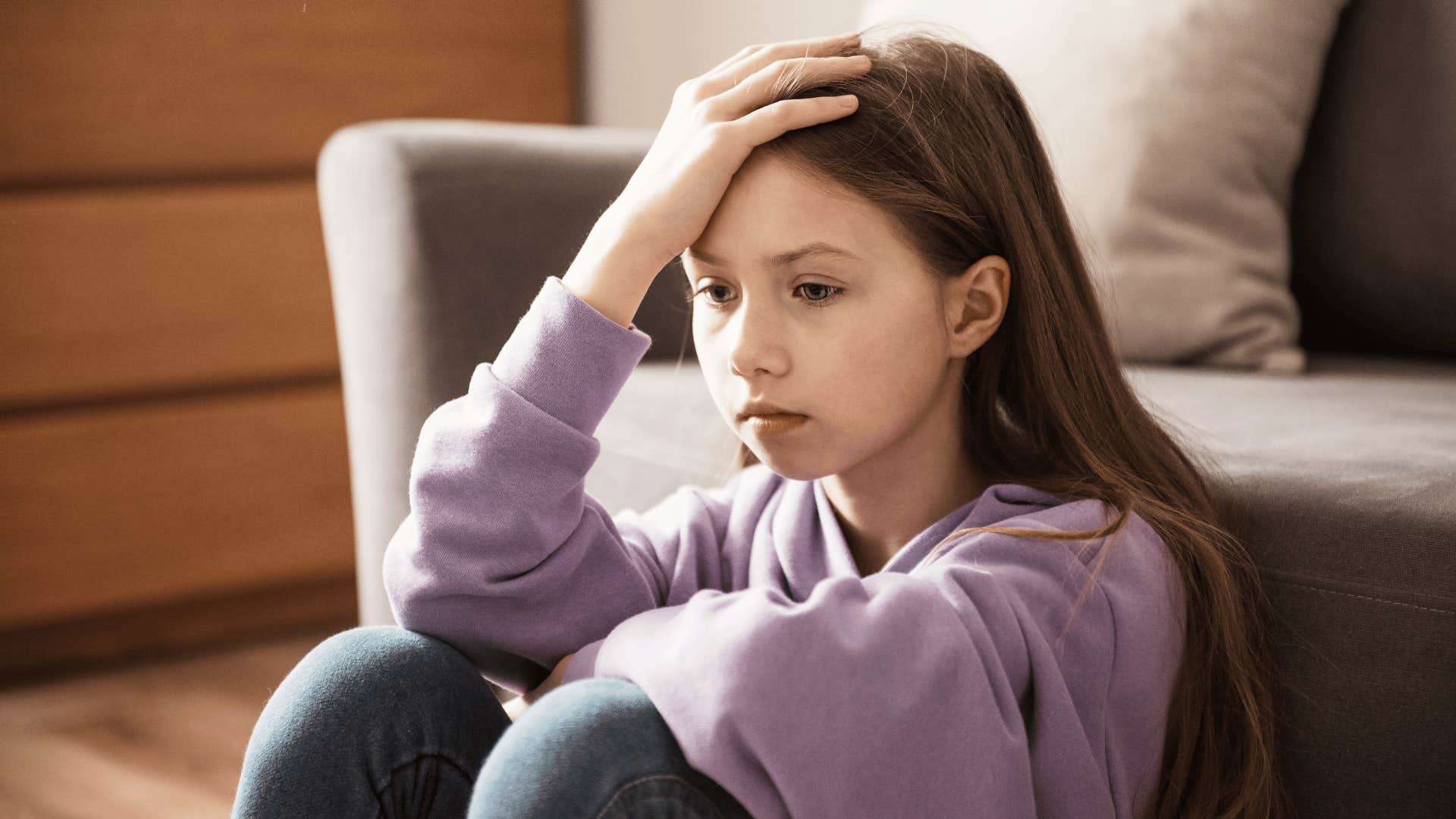10 Signs You're The Scapegoat Kid In A Dysfunctional Family Who Refuses To Ignore A Parent's Bad Behavior
Remind yourself that you're more than enough, even when your family tries to cut you down.
 YAKOBCHUK VIACHESLAV | Shutterstock
YAKOBCHUK VIACHESLAV | Shutterstock Children who are raised in a dysfunctional family often do anything they can to survive day-to-day. Some kids align themselves with their parents as a self-protective measure, while others are put in the position of being an outcast. It's not always obvious when certain toxic dynamics are playing out, yet there are usually clear signs you're the scapegoat kid in a dysfunctional family who refuses to ignore a parent's bad behavior.
Scapegoating can be described as a form of mistreatment, in which one person is singled out by a group of people. When scapegoating occurs in a dysfunctional family system, one child is blamed for the family's problems. Scapegoating is usually wielded as a tool that allows parents to maintain control over their kids' behavior and the overarching family narrative.
Recognizing the signs of scapegoating can be difficult, but putting words to the experience can help set scapegoat kids free from their feelings of shame and anger.
Here are 10 signs you're the scapegoat kid in a dysfunctional family who refuses to ignore a parent's bad behavior
1. You're blamed for other people's behavior
 Ground Picture | Shutterstock
Ground Picture | Shutterstock
A sign you're the scapegoat kid in a dysfunctional family is being blamed for how other people act or being held responsible for the family's public image. If you're being scapegoated, your parents probably maintain the idea that everything would be perfect if it weren't for you.
According to an article titled "Scapegoating," published in The SAGE Encyclopedia of Marriage, Family, and Couples Counseling, dysfunctional families resort to scapegoating because blaming one person for everyone's issues makes it so they don't have to actually examine their dysfunction. Scapegoats allow dysfunctional families to have homeostasis, which is "the tendency to keep things in the family system just the way that they are."
In a dysfunctional family, the scapegoat kid plays a very specific role: They relieve the tension caused by all the underlying, unspoken conflicts at play. Scapegoats might get called out for noticing what the rest of the family refuses to admit, which is usually the presence of unhealthy and damaging family dynamics.
2. You're constantly criticized
 fizkes | Shutterstock
fizkes | Shutterstock
Being judged more harshly than the rest of your family and being criticized on a constant basis are signs you're the scapegoat kid in a dysfunctional family who refuses to ignore a parent's bad behavior. Your parents might hold you unrealistically high expectations, while your siblings aren't held to any. They expect perfection from you, in part because they know you can't reach it, which then lets them pick on your perceived flaws.
As trauma therapist Patrick Teahan pointed out, this kind of unrelenting criticism is often an indication that you're being raised in an "anti-love family" with "a deficit of affection, appreciation, [and] warmth." Teahan explained that the way kids are treated in an anti-love family stems from parental "contempt and disgust for some, if not all of the family members, so children are just recipients of such contempt for their parents."
No child deserves to be held to a higher standard or cruelly judged for being who they are, which is why Teahan noted that many adults who come from anti-love families have to work on two specific things in therapy: "The betrayal of love and responsibility by holding parents accountable for not doing anything about their own highly toxic stuff, [and] buying into the idea that they're loveable."
3. You're given inconsistent treatment
 New Africa | Shutterstock
New Africa | Shutterstock
The rules and expectations that your parents set for you might change on a whim, without any explanation. This inconsistency serves to destabilize you, and lets your parents blame you for their own mistakes.
As Lori L. Ellison explained in her article "Scapegoating," the act of choosing one child as a scapegoat "is a means of deflecting attention from the real conflict... The goal of the family is not to deal with and resolve the issues, but, rather, to cover them up."
Yet Ellison also noted that scapegoating might provide temporary relief to the rest of the family, but in the end it only exacerbates the dysfunction that's already there. Being the target of inconsistent treatment is a sign you're the scapegoat, which inevitably leads you to feel angry and alone.
4. You're expected to apologize all the time
 Gladskikh Tatiana | Shutterstock
Gladskikh Tatiana | Shutterstock
Being the scapegoat kids means you're expected to apologize, even when you've done nothing wrong. You're responsible for your family's well-being and the image they present to the public, so if anything goes wrong, it's all your fault.
Clinical psychologist Dr. Samantha Rodman Whiten explained that "Abuse and neglect affect the child's ability to trust the world, others, and themselves." Kids who were scapegoated "grow up without a frame of reference for what is expected and healthy. They may develop traits they struggle with throughout their adult lives, with many effects."
Over-apologizing, even in adulthood, for things that have nothing to do with you, can be an indication you were raised to be the scapegoat kid in a dysfunctional family who refuses to ignore a parent's bad behavior.
5. You're isolated by your family
 Bricolage | Shutterstock
Bricolage | Shutterstock
If your family actively isolates you, your parents might pit you against your siblings by telling them to avoid you or not trust you. They see you as an outsider, someone who doesn't fit into the rest of the family schema and, in some ways, you don't.
Your ability and willingness to face the dysfunction within your family while everyone else buries their heads in the sand shows that you are, in fact, different. You're trying to break the cycle of dysfunction by calling it out for exactly what it is, yet this very behavior threatens your family's way of functioning, which is why they try to keep you isolated.
6. Your emotions are weaponized against you
 LeManna | Shutterstock
LeManna | Shutterstock
Having your emotions weaponized against you means you might have what's actually an entirely normal emotional response to your family's dysfunctional treatment, but your reaction gets framed by your parents as totally uncalled for or out of control. They call you "unstable" or "crazy" or "too sensitive" as a way to invalidate what you're feeling and keep on going with business as usual.
For a scapegoat kid in a dysfunctional family, it's normal for their parents not to accept or value their emotional reactions, which means that they often grow up not knowing how to be comfortable around people who do actually hold space for them.
As life coach Ann Papayoti explained, "Sometimes, what is familiar is extremely unhealthy. Because it's familiar, it may not look like a red flag at all. Some relationship red flags seem 'normal' to us." A scapegoat kid might have to spend their adult life recalibrating to allow themselves to feel things deeply, because they were trained not to do so by their parents.
7. You sacrifice your own needs
 Iren_Geo | Shutterstock
Iren_Geo | Shutterstock
You sacrifice your own needs to maintain the "harmony" in your family system. You feel forced to meet everyone else's needs first, which means you never learned how to take care of yourself without feeling guilty for it. It might feel impossible now, but YourTango experts pointed out that you can build a life you love after dealing with a life of family dysfunction by taking small actionable steps and checking in with yourself as you go.
Soul relationship coach Carolyn Hidalgo shared, "Understanding how toxic elements of family dysfunction you might still carry is key." She continued, "If you get triggered by family, healing is needed before you can build your ideal life. Letting go of dysfunctional family dynamics opens the space to create a life you love without apology, permission, or need for justification."
Trauma specialist and licensed psychologist Aline Zoldbrod noted, "One of the skills you need to build to have a happy life when you come from a dysfunctional family is to develop the courage to figure out what you want and need and to ask for it from the people you love."
"Make a fearless inventory of how you make yourself invisible in your relationships," she continued. "Build up some coping strategies and resources to soothe yourself when you ask and are disappointed by the response you get."
"Keep on figuring out what you need, and keep on asking for it kindly and constructively. You'll get much more of what you need, feel more seen and loved, and have a much richer and more fulfilling life," she concluded.
8. Your feelings are dismissed
 fizkes | Shutterstock
fizkes | Shutterstock
A truly glaring sign you're the scapegoat kid in a dysfunctional family who refuses to ignore a parent's bad behavior is that your feelings are consistently dismissed as trivial and unimportant. Anytime you speak up or try to advocate for yourself, your parents tease you or outright ignore you.
Paying attention to your feelings would mean they would have to take a deep, long look at their own behavior, which they're incapable of doing. It's much easier to keep dismissing you as the one who's wrong, instead of being self-reflective and questioning their own damaging ways of existing.
9. You're unfavorably compared to others
 SeventyFour | Shutterstock
SeventyFour | Shutterstock
Parents who play the comparison game set their kids up to have a low sense of self-worth. They prime their kids to seek external validation, while always putting themselves down for not being good enough.
Scapegoat kids get negatively compared to their siblings because they're the ones making waves and standing up to the dysfunction, while their siblings are complicit in it, often due to no fault of their own. After all, they're just trying to survive, too.
Scapegoat kids have to free themselves from assigning any meaning to their parents' comparisons. They have to do the hard work of recognizing that they are worthy, exactly as they are, despite the messages their family sends.
10. You're the target of collective gaslighting
 Indypendenz | Shutterstock
Indypendenz | Shutterstock
If you're the target of collective gaslighting, it means your parents and siblings gang up against you to deny your lived experience. They pretend things happened differently, which leads you to doubt your perception and your own sanity.
Being the target of collective gaslighting can make you feel like you're the one who's remembering the past incorrectly. Your family's efforts to rewrite history and invalidate what you feel are just one more power play in their game of dysfunction. They're trying to shift the blame, while you're trying to get them to own it, which might never happen.
If you're the scapegoat kid in a dysfunctional family who refuses to ignore a parent's bad behavior, do whatever you need to do to stay safe. Remind yourself that you're more than enough, even when your family tries to cut you down.
Alexandra Blogier, MFA, is a staff writer who covers psychology, social issues, relationships, self-help topics, and human interest stories.

